My thesis: story telling matters and Star Wars tells a good story.
My secondary thesis: J. J. Abrams almost ruined Star Wars and it happened long before "The Rise of Skywalker."
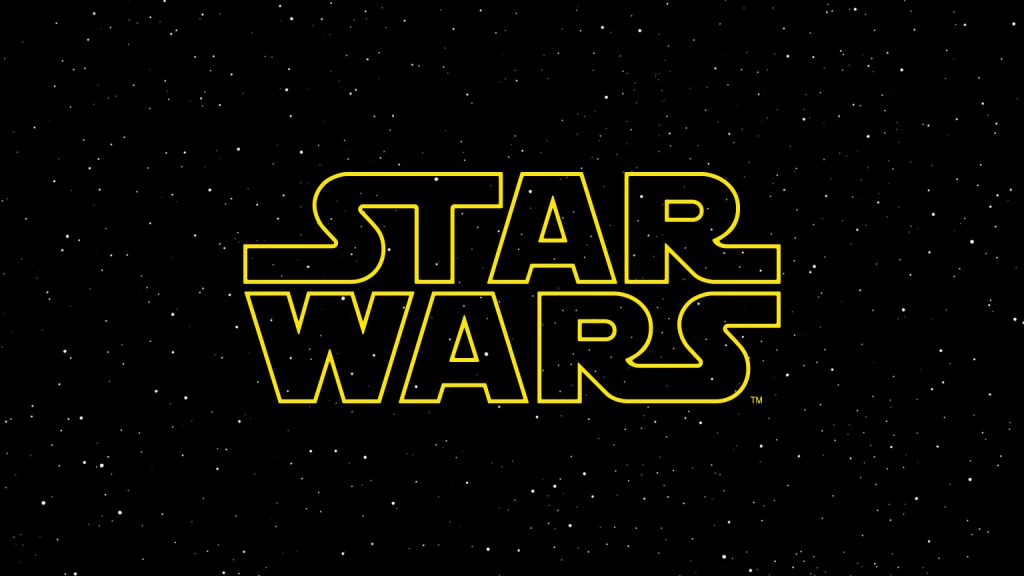
I'll explain:
Understanding Myths and Stories
You can fault George Lucas for many of the prequel problems:
- Over-dependence on CGI
- Uncomfortable, untimely love story (Anakin as a pre-adolescent - no, thanks)
- Failure to mesh with the first trilogy
But let's think about the original trilogy for a minute.
The original Star Wars trilogy had clunky elements.
- The story was obviously made up as Lucas went along. A lot of that can be blamed on the fact that he didn't know if the first movie would succeed and if he'd get another chance to make his movies.
- The dialog is laughable at times. (Harrison Ford called Lucas out on this. "You can type this ****, but you can't say it," is what he's supposed to have said about the scripts.)
- The direction is uneven over the three films: directed by George Lucas, Lawrence Kasdan, and Richard Marquand, with varying levels of insight.
Myths and Stories and their Elements
Elements George Lucas Included:
- Simple Hero (farm-boy) who must go on a quest
- Princess, who needs rescue and is the "heart" of the story
- Rogue, possibly good / possibly bad, maybe does the wrong thing but has good intentions in the end
- Seer, wise older mentor
- Evil personified which must be defeated
- Fantastical supporting creatures
What George Understood:
Whether Lucas intended to make three movies or six or nine doesn't really matter in the end. He understood that the boy should get the girl. Evil should be defeated. Justice must be done, but in a hopeful way that displays mercy and grace.
George Lucas credited Joseph Campbell for inspiring Star Wars. Campbell promoted the idea of "monomyth." This is the concept that all stories are part of a single, great story.
(This should sound familiar to Lewis, Tolkien and even Andrew Peterson or S.D. Smith fans.)
You can consider this concept by thinking about other myths and legends that have become well known in Western culture. St. George and the Dragon, King Arthur, even Robin Hood typology shows up in Star Wars (and many other places.)
Understanding themes and characters that audiences would appreciate enabled Lucas to tell a story that dominated the box office and changed movies and science fiction forever.
(While the original trilogy was almost universally loved, I do also love the story of my husband's grandmother who fell asleep - in the theater - the first time she saw Star Wars. She told me she never did understand what all the fuss was about. So, it didn't work for everyone!)
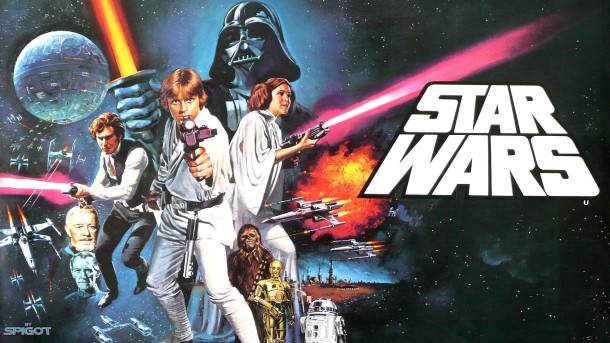 Finding Balance in the Star Wars Mythology
Finding Balance in the Star Wars Mythology
Star Wars has taken a lot of criticism over the years (here I speak mostly of Christian reviewers) for its "Eastern" influences. (A mystical Force that binds everything together being the main culprit, alongside light and dark being a duality that must be balanced).
But I have always argued that Lucas has a fundamentally Western approach. My evidence is not just that his movies are so clearly based on the 1930's serials (that's where the opening crawl comes from) or Westerns (themselves based on myths and legends) or even World War II Battle movies (where all the aerial dogfighting originated), but in how Lucas treated death.
Life after death - not in an amorphous consciousness type existence, but in an actual human form (with glowing edges) is not really represented in worldviews where you cease to exist after death.
How this is displayed in Star Wars:
Star Wars characters (Obi-Wan Kenobi, Yoda, and, decades old spoiler alert, Anakin Skywalker) can talk with and interact with people and, apparently, the environment surrounding them even after they die. (Although that little twist doesn't occur until the latest trilogy.)
Now, it can be argued that this process is "hand-waved" by explaining that only certain Jedi have attained this skill. Padme, the seemingly forgotten mother of the Skywalker twins, gets no such treatment. (Except, cough, in fan fiction. I may or may not have written some post-ROTJ Fan Fic myself. But I will say no more on this subject...for now.)
And lo, in the "last" of the Skywalker saga a character who is not Force sensitive appears to someone who needs him. Figment of the imagination? Maybe. Or maybe "no one is ever really gone."
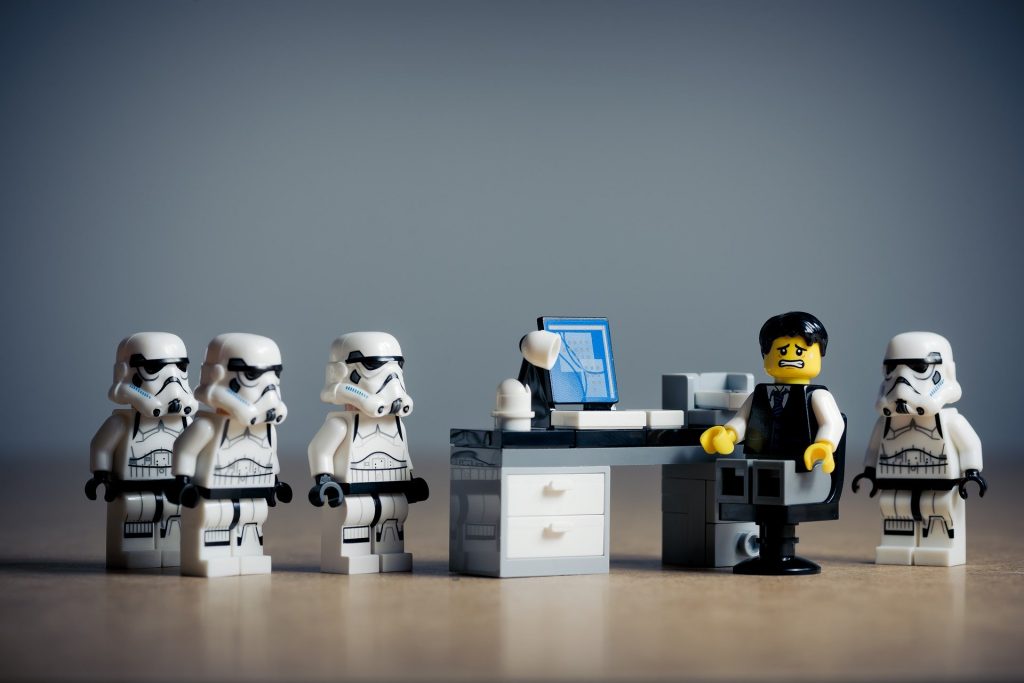 And Then Disney Acquired Star Wars
And Then Disney Acquired Star Wars
After the original trilogy and before the prequels, there were novels. And comics. And video games.
After the prequels there were novels. And comics. And video games.
Then the Mouse swept in. Lucasfilm was purchased and suddenly, a new trilogy to "complete" the saga was planned. But Disney ignored all the material that came before.
(Which was, honestly, a mixed bag. You had good novels - looking at the Thrawn Trilogy by Timothy Zahn, and bad ones - looking at you, most of the rest. I never play video games but I'm assuming the same would apply to the many games and comics.)
Disney both reboots and restarts the old story.
By...kind of making the same story.
One of the main criticisms is that The Force Awakens is a remake of A New Hope. Which I'm not sure I agree with, in the end, but it's a point to consider.
Here's where we get into "This is J.J. Abram's Mess" territory:
See original secondary thesis above. And here's my real question: why bring back the original trio at all?
- The Assassination of Han Solo by the Coward J.J. Abrams
Everyone knows Harrison Ford wanted out of Star Wars. He wanted his character killed off in Empire or Jedi but Lucas didn't allow that. (Thank you, George!)
So pretty much everyone knew, when TFA cast was announced, yep, Han Solo is a goner. No way they're getting him to sign up for a three movie experience. (However, in the end, when it mattered, Harrison Ford did show up again. Kind of like a scruffy nerf-herder we all know and love. But I digress.)
Which, fine. I could have handled Han sacrificing himself for someone he loved. Luke. Chewie. Leia. His son. (spoiler!)
But that's not exactly what happens. Instead, Abrams undoes every bit of character development Han Solo had over the original trilogy.
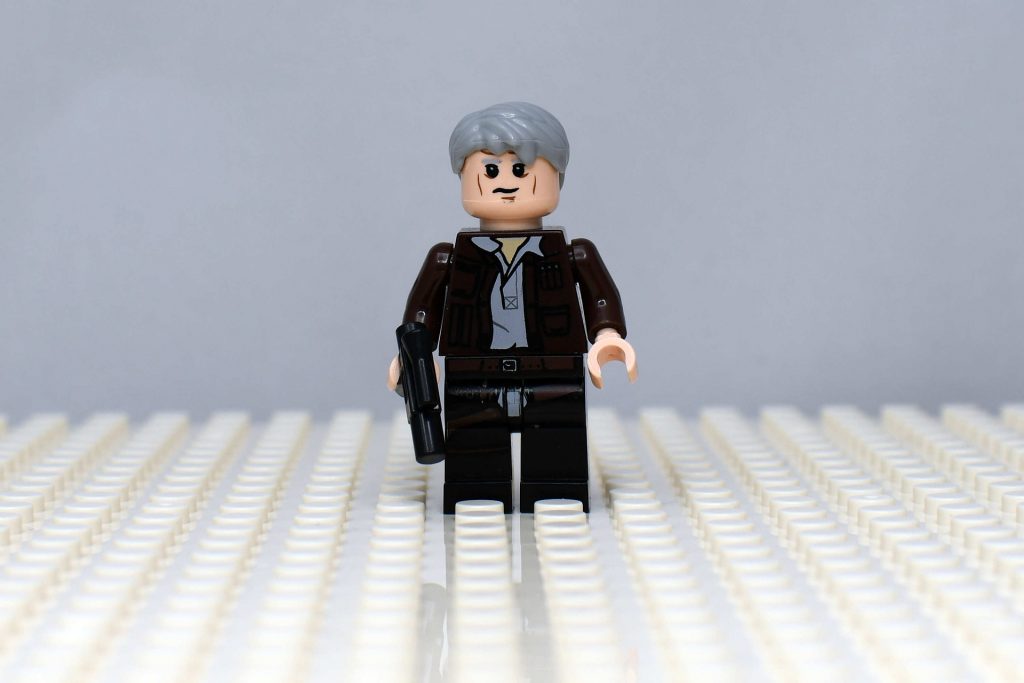
Original Trilogy Han Solo
Han goes from a guy just trying to survive (and make a lot of money) to a man who cares about something bigger than himself.
He goes from a loner (with a sidekick) to a man committed to a cause (rebellion against the Empire) and a family. (Which includes Leia, his soon-to-be wife or anyway, the galaxy far, far away equivalent of wife, and a brother-in-law and, somewhere along the way, a son).
But in The Force Awakens, Abrams undoes that. Han is a loner again (with a sidekick).
He cares about getting his ship back (it's the Millennium Falcon, of course he wants it back). And he's kind of sad, maybe, about his son being all emo / evil.
What We Get Instead of Happily Ever After
The audience gets a Han and Leia hug. So, they're...cordial. Consciously uncoupled, as Gwyneth Paltrow might say.
Because everyone in 2015 knows that parents don't stay together. That's just the way it is. No one is surprised that Ben Solo's parents split up.
That's what parents do, J. J. Abrams seems to confirm. (And, frankly, if you had an absentee father like Han seems to be and a Very Busy Mother like Leia appears to be, can you imagine growing up as their child? No wonder some dark force could exploit the future Kylo Ren.)
THIS IS NOT STORYTELLING.
This is twenty-first century realism instead of space-fantasy.
Here's what would have made more sense: Han and Leia still committed to each other. Han and Chewie could have been out searching the galaxy for the lost boy. And oh, maybe Luke could be around and caring about all of this as it's happening.
For all the grief Rian Johnson takes for The Last Jedi, let the record show that it is J.J. Abrams' fault that we don't get our original trio together in a single scene.
How this Could have Been Fixed
Move the story far enough into the future that the "happily ever after" from Return on the Jedi isn't ruined.
If Disney had insisted the original trio must show up (to ensure box office success in a script full on unknowns), do some flashback stuff.
Leia's Movie?
Here's an unpopular opinion: Carrie Fisher couldn't have "carried" the third or any movie in the trilogy as everyone keeps saying was the original plan. (Han - The Force Awakens, Luke - The Last Jedi, Leia - The Rise of Skywalker).
Carrie Fisher was brilliant and funny and complicated. She left us too young and far too tragically. If you want to read some raw, honest, funny, writing try her books.
But her acting depended on her comedic ability and innate sense of timing, not a finely honed dramatic acting ability. Honestly, even her face was no longer as mobile as when she participated in the original Star Wars trilogy. (Which we can probably blame on Hollywood's continued insistence that she be a thinner, younger version of who she actually was).
No Solo Acts in Star Wars
And, anyway, the point of the original three was their onscreen chemistry. You wouldn't want to watch a movie about only one of them. There isn't really supposed to be ANYONE carrying a Star Wars movie on their own. (Which might be one reason among many why Solo was disastrous.)
So, while Carrie Fisher was the heart, humor, and soul of the saga, it's just as well that the screen writers couldn't be even lazier and say, "well, the audience will buy this garbage story because it's PRINCESS LEIA." (Which they kind of try in The Last Jedi and The Rise of Skywalker. Need to make the characters go somewhere and do something? Better have Leia command it.)
- What's the First Order Anyway?
Here's criticism number 2 of lazy story-telling in The Force Awakens: The First Order is just the Empire with a new name.
And it's strong. Super Strong. Starkiller Base strong. (Think the Death Star's planet killing ability was bad? Well, this weapon can destroy...entire systems!)
And now Leia is General Organa in the Resistance, which is just the Rebellion with a new name. And, guess what, they're still the underdogs.
THIS IS NOT STORYTELLING.
If J.J. Abrams and the Disney screenwriters had an ounce of imagination, they would have asked themselves, OK, what happens after you win the war? What does healing a galaxy torn apart by twenty years of war look like? What might those challenges be?
(Also, total digression: I am tired of seemingly everyone classifying Rogue One as one of the best Star Wars movies. 1. It's a hot mess, as the trailer vs. final footage confirms, and 2. It's not Star Wars. It might be a good sci-fi flick, or a great war movie, but it's not Star Wars. I have spoken.)
Questions The Force Awakens Gets Right
So, here's one thing Abrams did right in TFA: Finn.
A stormtrooper who can't storm with the troops any more. He quits. Tossing aside his helmet, he walks away.
Which is a great component for a good story!
But...nothing comes of it. Our "heroes" continue wiping out stormtroopers as the faceless hordes they are, even though they know one storm trooper changed his mind about the whole thing.
(And this is my main argument against everyone who says Kylo Ren can't be redeemed. He killed a bunch of people? Well, so does the Resistance. You're telling me that all of a sudden we know what's good and bad in this universe with no clear model of right and wrong? Hmm...)
Rian Johnson was less interested in Finn as a former stormtrooper, I think. He gives him a new sidekick and a new adventure. All of which proved very unpopular with some “fans” on the internet. (YMMV)
But when J.J. Abrams has a chance to fix the Finn problem in The Rise of Skywalker he...does not. Instead of quitting stormtrooping being a choice Finn made, and exploring what that means and why others could be doing the same thing if the Resistance had tried that path, it's all brushed away with "The Force Made Me Do It."
THIS IS NOT GOOD STORYTELLING.
How Do You Solve a Problem Like...Reylo
“Reylo” is the part of Star Wars fandom that "shipped" Kylo Ren and Rey ending up as a couple. Now, I cannot say that I bought into this being "endgame" for the Disney trilogy. (And I did not frequent the Tumblr type accounts posting their evidence minutely examining every scene between the two.)
This was mostly because I was pretty sure Disney was going to pull a "Just kidding! They're twins like Luke and Leia!" because no one involved in this trilogy seemed to have an original idea.
But...Rian Johnson did have some original ideas. And the scenes he put into his TLJ seemed to slam the door on Ben Solo / Rey Nobody being related. (Unless...ick.)
Holding Out for a Hero
Watching The Rise of Skywalker in the theater I found myself totally invested in this relationship and, therefore, in "Bendemption." (As the Reylos helpfully called the concept of turning Kylo Ren back into Ben Solo. Because everything has to have a cutesy name, I guess.)
I, a life-long fan of Star Wars, had been so disillusioned by The Force Awakens and the toxicity surrounding The Last Jedi that I no longer visited fan sites or news sites with Star Wars spoilers. So, I didn't read anything about the final movie. And I was as unspoiled as it was possible to be.
I also already knew J.J. Abrams has a reputation for being terrible at endings and I had no expectations that I would enjoy anything he did in the "final" story of the Skywalker saga.
But, despite my criticisms of Abrams and his frenetic attempt at "ending" the saga, there were parts I enjoyed. And they were all about Kylo Ren (Ben Solo) and Rey.
There are two reasons for this:
- Adam Driver is a phenomenal actor.
Like, really, really, world class good. The Academy could just give him the Oscar lifetime achievement award now and save themselves some time.
I honestly didn't realize this in The Force Awakens. I had never watched (nor do I plan to ever do so) Girls, the Lena Dunham driven HBO series. Apparently, he was good in that too. But I will never know for myself.
Anyway, he's good. My husband and I have been watching some of his other stuff now (but not Girls, duh) and he is seriously talented. He can easily sell a scene without speaking. (Which is handy when the screenwriters don't give him many lines.)
Mild digression:
I saw a funny tweet about Adam Driver needing spinal surgery after carrying the new Star Wars trilogy alone on his back. And this is not wrong. (It also illustrates that the decision not to give him any lines in the last section of The Rise of Skywalker was a really dumb choice.)
In addition to Driver, Daisy Ridley is just immanently likable. Her acting is fine, but it's her likability that saves her on screen. You just want to believe in her, no matter what.
(Which, side note, seems to reveal something that J.J. Abrams is actually good at: recognizing female talent. See Jennifer Garner, Alias, for the first, best evidence of this. And no, I do not accept Keri Russell as the first evidence because I didn't watch the show Felicity.)
- Rey and Kylo Ren / Ben Solo are the only characters who ever change their minds and / or grow in the entire three movies.
Mostly, they change their minds about each other. But it still counts because...
To be interesting, characters must grow and change.
Bad guys can't just twirl their proverbial mustaches all the time. Good guys can't just continually help little old ladies cross the street.
Someone has to DO SOMETHING at some point in the story and this thing that is done has to affect SOMETHING ELSE in the story. And this has to continue happening until the end.
A Problem with Fandom
Fans are short sighted. We want what we want with the characters we love. If I dare speak for all of us (I do not, really), we do not have the story's best interests at heart.
Here's one example: Finn and Poe.
Some folks loved these two characters. And the fact that Oscar Isaacs would probably have chemistry with a paper bag led to a push by some fans to make Finn and Poe a couple.
(Because friendship is a foreign concept, apparently. And two men cannot be friends in 2019...or a long time ago in a galaxy far, far away.)
I know, I know. There are people who would like to see their particular experience represented. And I get that.
So...here's my suggestion for that:
- Make a movie with characters that represent what you want represented
- Write a great story that says what you want to say
- Make a great superhero that's different from all the rest
- Depict a family unit as you want it to look
In other words: throw our reality upside down and create a convincing story about it.
But squeezing in token representation is problematic on a story level.
And, ultimately, it ends up making no one happy. (See some fans' response to The Last Jedi for one example and oh, yeah, The Rise of Skywalker for another.)
Just taking a list of themes (as in the earlier section of this essay) and throwing them all into your story soup won't necessarily make a convincing whole any more than making a list of things you want represented and then squeezing all of it in whether it fits or not.
The myriad ways audiences could change stories is why Fan Fiction and fan sites exist.
By the way: most fan fiction is terrible. (Ask me how I know.) This is usually because the author is trying to force something to happen or squeeze in some viewpoint that the initial structure of the story just does not support. But feel free to keep trying!
Unfortunately, the relationships that Rise of Skywalker try to convince of us are not convincing either. After three movies we finally get some scenes of what Disney marketed as “the trio” (Rey, Finn, Poe). But it’s too little, too late.
How J.J. Abrams and Chris Terrio Ignore Character Development
Other than Rey and Ben (see above), no one's growth or change ever sticks.
The Character Assassination of Han Solo discussed above is the first example.
The second example is Poe Dameron, hot shot pilot, man's man, man about the galaxy.
The Last Jedi tells his story this way: he's talented but afraid to be a leader. But, thanks to some hard-learned lessons and a kick in the pants by General Leia, by the end he's leading and a tiny group of people are following. Hooray!
Curtain rises: The Rise of Skywalker.
Poe Dameron, dashing pilot, man's man, man about the galaxy is...talented but afraid to be a leader. Until he learns some hard lessons and gets a kick in the pants from General Leia (and / or her inevitable death).
My, how original. She said, dryly.
How Abrams and Terrio Ignore Cohesive Story
There was no plan. That’s the long and the short of the answer to the question "What went wrong with the sequel trilogy?"
Some of this, but certainly not all, came from the idea that they would have three different directors (J.J. Abrams, Rian Johnson, Colin Trevorrow) for each of the three films. I don’t think that would have worked, either, but we’ll never know.
Because, for whatever reason (depends who you ask), instead of Trevorrow’s ideas we got Abrams for film #3 or the ninth one or whatever you want to call it. (It may be the “last” in the “Skywalker Saga” but will certainly not be the last time Disney makes a Star Wars film. And, by the way, I don't know anyone who referred to these movies as the Skywalker Saga before now. And it makes even LESS sense after Abrams did whatever he did in The Rise of Skywalker. The Palpatine Saga, maybe…)
Fan Service or Flying Blind?
One critic has written a piece called The Emperor Has Only Groove. The basis of his argument is that Abrams has no idea how to tell a story, but lots of ideas about what might be cool on screen.
I think this has merit. It’s why Abrams’ Star Wars movies are so full of “fan service”, that is: what the director thought fans wanted to see and why they are ultimately so unfulfilling. (This emphasis on style over substance reminds me of young Anakin in The Phantom Menace, “Let’s try spinning! That’s a good trick.”)
The Galaxy of Missed Chances
So, what if instead of whining about The Last Jedi and Rian Johnson's artistic choices, Abrams and Terrio had actually played in the sandbox with the new toys?
What if Poe Dameron actually leads the Resistance from the beginning?
Or if the good guys were responding to whatever happened at the end of The Last Jedi instead of waiting for Lando to somehow jet around and gather them all up. (By the way: what did he offer that Leia didn't? And how does EVERYONE know the way to the super-secret planet of Exegol now?)
And the Bad Guy Is...
Who could have been the bad guy instead?
Maybe Snoke could have been a clone and there were actually MORE Snokes to kill? (Hey, why not?).
Maybe Darth Plagueis has been orchestrating something from way, way beyond the grave?
Or maybe Hux, the slimy, weaselly, middle-management Fascist rises to the evil occasion and we didn’t actually need a Sith Lord to be the baddie?
Any of these might have worked.
"Here's Palpatine!" is the worst choice in this movie.
Bringing him back completely undoes Anakin's sacrifice in Return of the Jedi. And making Palpatine the grandfather of the main character is lazy at best and gross at worst.
The Sith planet is eerie and the Sith cultists are also creepy and honestly, if there had been some sinister figure trying to clone a bit of Palpatine they scraped off the Death Star wreckage during the movie, I might have bought it.
But that's not the story The Rise of Skywalker tells. Instead we get "Palpatine's Back!" in the opening crawl. THE CRAWL, people.
THIS IS NOT GOOD STORYTELLING.
But What About Ben?
So, to appease the Reylo fans, because this final movie is either a) full of fan-service or b) not full enough (I can't decide), Abrams and Terrio allowed one kiss between Rey and Ben Solo, there, at the end of all things.
Really, really, all things. Because Ben immediately fades away. (That's a powerful kiss right there!) And there's no explanation of where he went. Is he dead? Probably. Forever? Hmm...
Which is a shoddy way to end their story.
What if he lived? What would have happened next?
To quote our modern bard (Lin-Manuel Miranda, Hamilton): "Dying is easy, young man. Living is harder."
Or perhaps I may paraphrase: killing a character you don't know what to do with is easy. Finding out what to do with them next is harder.
Gone and Immediately Forgotten
And, worse than just Ben dying, Rey doesn't react.
The biggest event of her life - defeating evil side by side with her one true love or force twin or whatever he was - and he's gone and she doesn't cry or scream or sigh deeply or feel a single emotion?
Unless Rey is a stone-cold zombie, y'all.
(And, while I don't think Daisy Ridley was the strongest actor in this trilogy - that's Adam Driver, no contest - I feel like she would have done something, said something, or communicated some type of emotion here if the director had actually communicated what story they were telling.)
Siblings and Dyads and Trios, Oh My
Even worse, than the kissing and fading away, J.J. Abrams is on record as saying that Ben and Rey were like siblings and he didn't see them as romantic. If you kiss your brother like Rey kisses Ben in this movie, please, seek help immediately. That's not normal.
Instead we’re supposed to feel that “the trio” (see above) reunited is the emotional center of the film.
But, because so little is invested in the fictional relationship of the three – and since John Boyega’s acting is not quite up to the standard of Driver, Isaacs, or Ridley – it all just falls flat.
(Side note: there are several long theories on line that the scene of Ben & Rey kissing, dying, etc. is badly edited and his death was not the original intent. Several of these are rather persuasive, not least the theories based on John Williams’ excellent score during this scene and his track titles which MAKE NO SENSE now but I’ll let you search out those theories yourself.)
What is Love, Er, Justice (Baby Don't Hurt Me)?
Yes, in other corners of the sci-fi internet there are howls of those who despise the Reylos and Bendemption screaming about Kylo Ren / Ben Solo "facing justice" and "he should be tried and convicted of war crimes" had he actually, you know, lived to the end of the movie.
To which I respond: under what law and by what court?
It sounds to me like these people want a strong inter-galactic government that decides what is right and wrong and who pays for it.
Maybe they might be interested in, say, an Empire with an Emperor? Or a First Order led by a Supreme Leader?
The galaxy far, far away is a big, messy place.
And there is no court to enforce an inter-galactic judgment on who the goodies and baddies were.
As far as this imaginary universe goes, there is no Deity overseeing all things. There’s the Force and there’s the nebulous concept of “Balance” which the Jedi are always on about.
Barring supernatural standards, we, the audience, are supposed to take our leading character's lead on what is right and wrong.
Original and Prequel Trilogy evidence: Luke (and Padme) insisting that Vader / Anakin is still good inside and that he is worthy of redemption or at least an attempt at redemption.
Sequel Trilogy Evidence: Rey has declared Ben good, worthy of redemption, deserving of life. She is the conscience of the story. (You could also argue Han and Leia's opinions would matter here too. And we already know how they’d vote.)
That’s what happens in a universe with no God. You are left with something…else, decided and enforced by something un-godlike. And in this case, it’s The Force. And the Force approved of whatever Ben Solo did to help defeat the Emperor. So, case dismissed. I will say no more on this matter.
The Limitations of the Force
And here again, we have illustrated the primarily Western, Christian-ish idea of life after death. Because, while our characters are continually reassuring each other "The Force will be with you, always," the Force seems to be just as "with" the dark-side users.
And, in the end, Rey does not call for "the Force" to be with her. She calls for help from the Jedi and THEY HELP HER. They speak to her, encouraging her. It's the presence of real people with real personalities and diverse life experiences who ultimately help her defeat her evil opponent, not an impersonal Force.
Obviously, I could write a lot more about this but we must move on as this essay is already over-long.
 Let's Continue Stunting Character Growth...It's Fun!
Let's Continue Stunting Character Growth...It's Fun!
So, The Rise of Skywalker is ending. And the one character that started the trilogy on a desert planet longing for a family is...alone on a desert planet (a planet that literally every character hated and could not wait to leave) and seems to be longing for a family she cannot have.
To make the point that she is exactly who she was when this story began she slides down a sand dune on a piece of rubbish. Yep, just like she did in the first movie before she had any adventures, love interest(s), or challenges to face down. And she has, apparently, stolen Poe Dameron's droid for good.
She’s even back to fixing her hair in the old three bun method of The Force Awakens. I hate this so much because, let’s be honest, any female character mentored by Princess Leia Organa, General of the Resistance is never going to have a boring, same-old-same-old hair do. Please.
This is the End?
The newest trilogy and even the first "Star Wars Story" Rogue One (I say again, NOT AN ACTUAL STAR WARS MOVIE. I have spoken!), have all banged on about "hope."
Hope is the point, they tell us.
"This will light the spark of hope." Or "This will be the flame that fans the..." blah, blah, blah... HOPE!
"This disc of information is hope." "This droid carries hope." (Sounds kind of like a communicable disease when you put it like that.)
Hope is the thing with mynock wings...
Maybe not.
What are we, the audience, supposed to feel at the end?
J.J. Abrams and Chris Terrio just spent an entire movie telling us that The Emperor was never really gone. The Final Order had more ships and more powerful weapons and, apparently, unlimited resources to fill them, even though there was no hint of all that from episode 6 until now (episode 9).
So, presumably, there could be another "Order" out there somewhere with another Big Bad Guy with a lot of ships and "weapons stronger than the Death Star" just ready to go. Or the Emperor will just come back. Again. Because that is what he does now.
But what about our heroes at “the end”?
Finn is...probably following Poe around. And he’s probably still ignoring Rose Tico as much as the filmmakers did. (The tale of what happened to Kelly Marie Tran in this movie deserves its own essay. I leave that to other writers.)
Poe is leading the Resistance to...who knows where and what? He can help make the New New Republic and then somewhere down the road, maybe they'll call them The New Rebellion and / or The New and Improved Resistance when what's old is new again!
Lando is either hitting on the first beautiful black female character he saw, or helping his daughter recover her stolen life, depending on what source you believe. Anyway, we don't know because the movie doesn't tell us. (And here's another can of worms: you shouldn't have to consume the related media - comics, TV series, video game, etc. - to understand a story.)
Chewie is...probably playing with some Porgs, I guess. He’s probably sad about Han, Leia, and Ben, but, let’s face it, the feelings of Wookies have never been high on these movie-makers’ priorities.
Rey is alone, with no family and no purpose on a planet that means nothing to her.
But hey, Rey has a new lightsaber. Great.
And a new last name...sure.
She wanted a parental figure for all three movies but Han didn't really want the job and he died before their relationship could grow. Luke threw the job away like yesterday's lightsaber. Leia gave some good hugs but she's also gone.
Kylo Ren / Ben Solo actually connected with her. (Across the galaxy, I might add.)
They fought together in two of the greatest lightsaber battles in the entire saga (don't @ me).
This movie tells us they were a "dyad" in the force. Whatever you take that to mean, one side of the dyad is gone, without even leaving the glimmer of his force ghost behind for her comfort.
What does that mean? Nothing. Everything. Who knows?
Who are you, again?
Maybe it would have made more sense for her to say "Rey Allthejedi" when the old woman on Tatooine asks her name, because that was the deepest emotional point the movie hit (and even that owes something to Marvel’s “And I am Iron Man” moment in Endgame.)
But Force Ghost Luke and Leia are smiling on her because...just because.
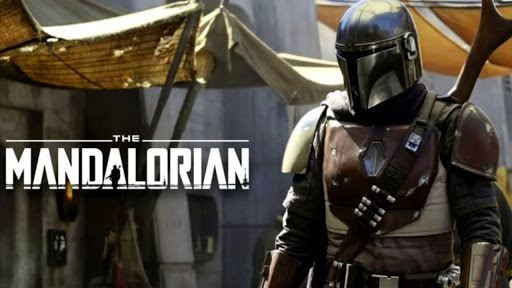
Maybe you've heard of a little show called The Mandalorian?
It's set in the Star Wars universe (a galaxy far, far away) and so far, it has managed to please audiences and critics. And there are stories about this bounty hunter that the screenwriters will be telling.
But something has hijacked all of that: "Baby Yoda."
Even if you haven't watched the show I guarantee you've seen something about the bat-eared baby alien.
Because he is cute. And fun to watch.
Babies make us smile. And give us hope for the future of something.
Maybe The Rise of Skywalker should have ended with a baby, any baby. Or at least that "broom kid" from The Last Jedi who's looking to the stars, dreaming of change, and using the Force. (Whatever happened to that kid?)
Babies and kids represent hope.
My conjecture: J.J. Abrams doesn't actually have any hope. He knew the job of making this movie was impossible (please all the fans AND Disney AND his own ideas, assuming he had some) so he circled back around to where he started. He couldn't give us what he didn't have himself.
THAT'S NOT GOOD STORYTELLING.
No One Believes in Happy Endings...or Happy Stories Any More
The STar Wars EU from before the Disney days didn't always do a great job. But the stories were optimistic. When I first read Timothy's Zahn's trilogy it was the Star Wars sequel I'd been wanting for a long time.
The Disney era EU is...cynical and dark. Everything it "adds" to the story is another layer of sadness and hopelessness. The battles are never won. No one gets to be in love and happy.
This is not a fairy tale in space: it's Shakespearean tragedy.
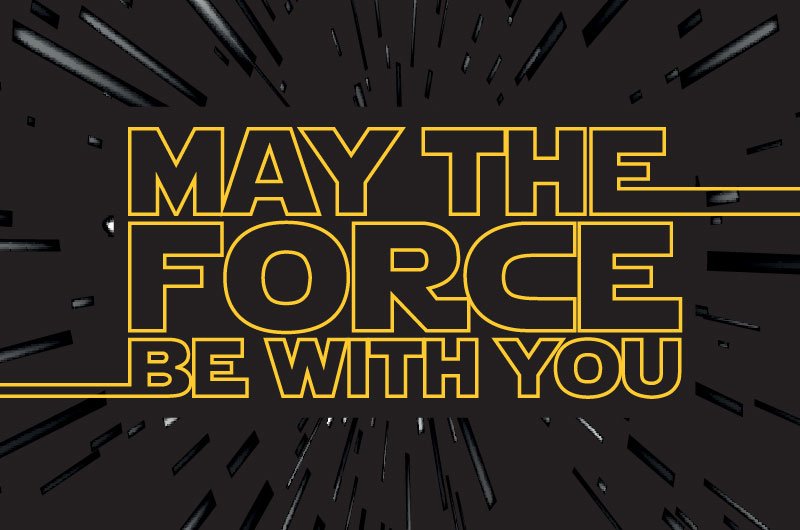 Storytelling Above All
Storytelling Above All
Here's the thing, and it's a thing I've been telling my husband since we saw the movie: I can't think of another movie I'm still thinking about (nay, writing about) days and weeks after I saw it. Or one that makes me so angry in its mistakes that I take time to consider how it could actually be fixed.
Only Star Wars does that to me. (Editorial concession: OK, maybe Jane Austen's stories and maybe Tolkien. Maybe. But I think it matters WHEN a story grabs your imagination and sci-fi / fantasy seems to do that a young ago.)
So, maybe Lucas and Disney and Abrams and Kathleen Kennedy and whomsoever else was involved in this, should have tried and paid more attention (or less) to Chiastic structure. (I can, as they say, preach that one either way.) Maybe triple trilogies was a faulty concept all along.
Boundaries are a Good Thing
In the original trilogy plenty of circumstances said "No." George's wife (now ex-) helped him with the script and the editing. His budget prohibited him from doing everything he wanted. Sometimes the actors wouldn't say the rubbish lines he wrote.
The Prequel Era George Lucas had more money than he knew what to do with. And he loved the CGI possibilities to the detriment of his actual, genuinely talented actors (once again, don't @ me because I will defend Ewan McGregor and Natalie Portman and yes, even Hayden Christensen until I die).
Producer Rick McCallum didn't tell George no. (You only have to listen to one special feature from the sequels to wonder why McCallum's picture isn't in the dictionary under "Yes Man")
George Lucas of the Prequel Era could have used a few people to say "no" to some of his ideas. Maybe someone could have reminded him of what Obi-Wan actually said in the original trilogy, or little things like the fact that Luke asks Leia about her "real mother" and she remembers. (I feel like Marcia Lucas saying "no" would have helped a lot, but that's just conjecture on my part.)
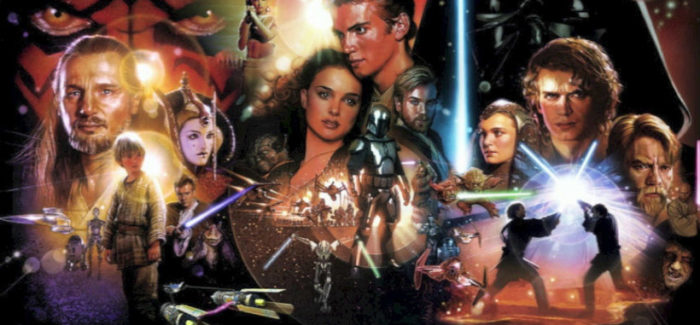 Sequel Era Star Wars learned the wrong lessons from the prequels.
Sequel Era Star Wars learned the wrong lessons from the prequels.
I think Disney saw one director with one vision (George Lucas) as the problem in the prequels. So they didn't have someone map out a clear plan for the three sequels. Disney had visions of dollar signs but no one who loved and understood Star Wars AND storytelling overseeing the project. (a la Kevin Feige for Marvel)
They had three very different directors lined up and then the third act director was out. So instead of finding someone new, they brought back the first dude.
Who, to remind you of my thesis way back at the beginning, already killed Star Wars in The Force Awakens.
Or did he?
As Luke says, "No one's ever really gone."
Maybe no good story is ever really gone either, no matter what happens along the way.
 What Star Wars Gives Us
What Star Wars Gives Us
The saga gave us a galaxy far, far away to dream about. (Aren't we all farm boys staring at the stars, really?)
The saga gave us some of the best music ever composed. (Thank you John Williams for your incalculable contribution not just to Star Wars but to cinema and symphonies around the world.)
The saga gave us some unforgettable characters...along side a few we'd rather forget. (Thank you to every actor who made your character truly live, even if your character died in the process. Side note: if Adam Driver decides to do a show where he just, I don't know, reads user manuals, I'd probably watch.)
I expect we'll be talking about Star Wars and the galaxy George Lucas created for a long, long time.














